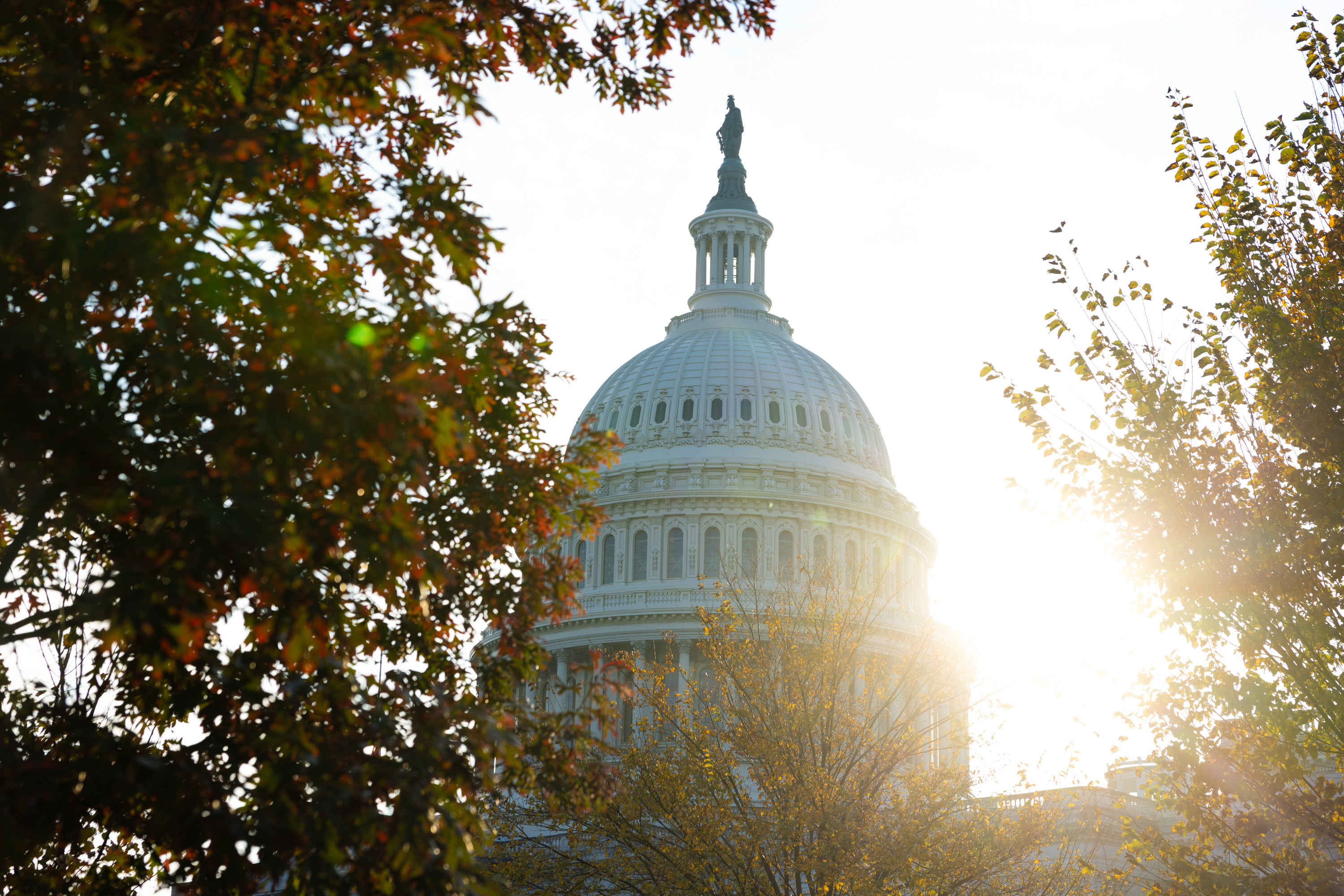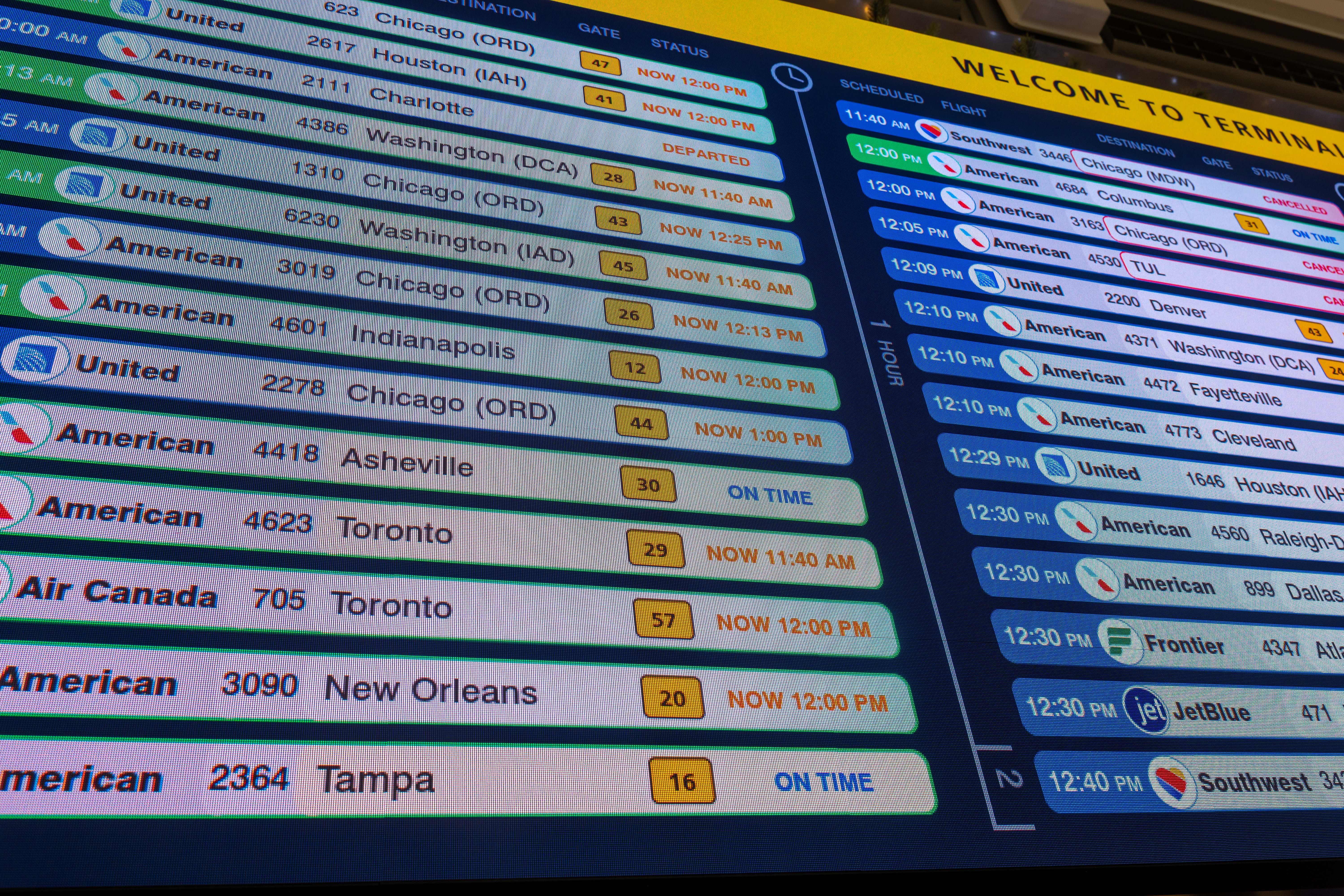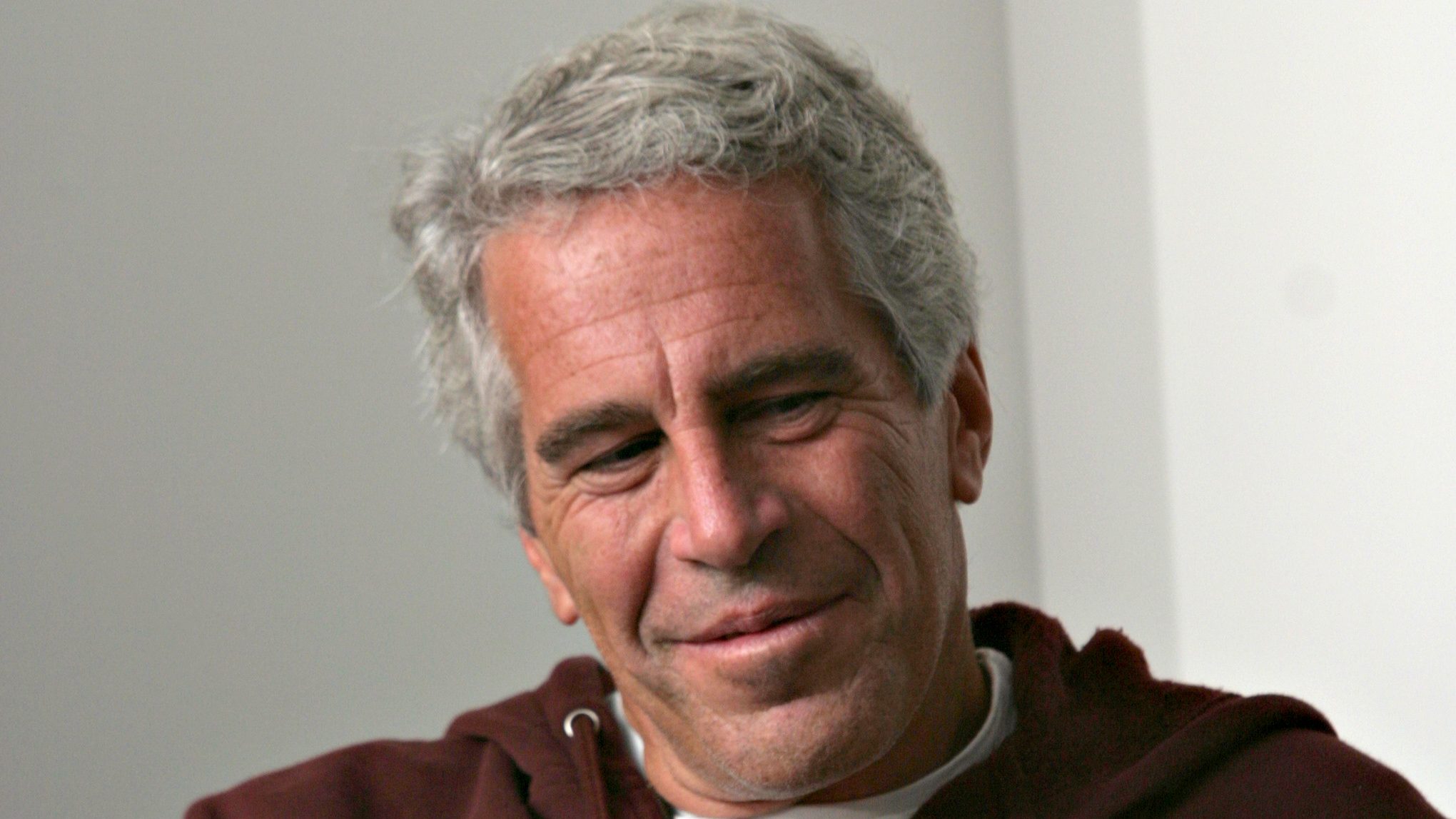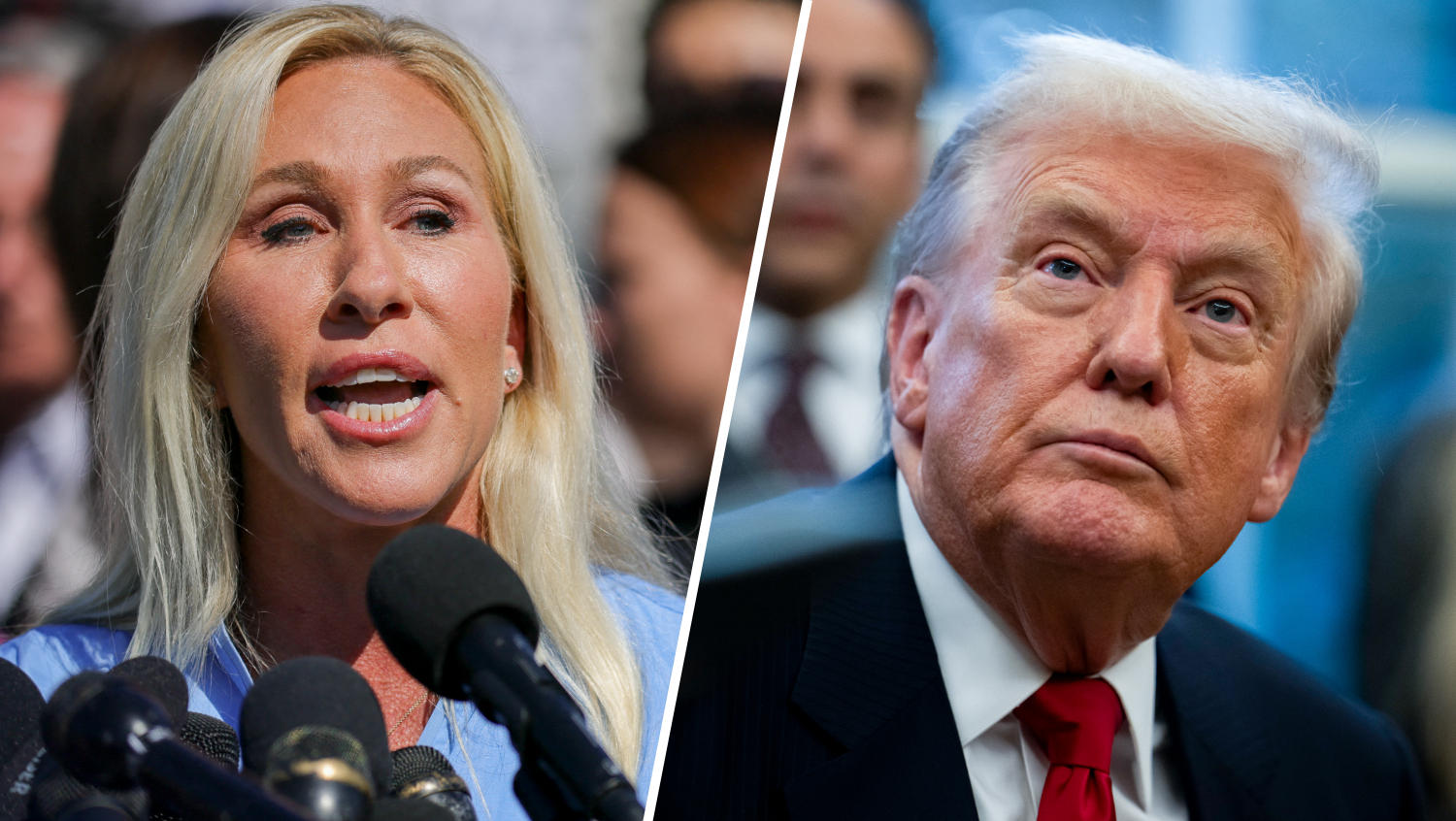Trump signs funding bill into law, ending record-long government shutdown

President Donald Trump on Wednesday night signed into law legislation that reopens the federal government and ends an acrimonious 43-day shutdown, the longest in American history.
Trump’s signature, which restores funding that has been frozen or halted for weeks, came shortly after the House voted 222-209 to send him the measure. Six Democrats joined nearly all Republicans in voting yes, and two Republicans joined most Democrats in voting no.
The Senate approved the same legislation Monday when eight Democrats peeled off and voted with Republicans to break a filibuster and end the shutdown.
In Oval Office remarks, Trump blamed Democrats for the shutdown.
“So I just want to tell the American people, you should not forget this. When we come up to midterms and other things, don’t forget what they’ve done to our country,” he said.
The successful House vote came after Speaker Mike Johnson, R-La., brought the Republican-controlled chamber back into session Wednesday for the first time since Sept. 19, wrapping up an extraordinarily long and unscheduled recess.
Johnson said he felt “very relieved,” before pointing the finger across the aisle, saying “Democrats were responsible for this.”
“Millions of American families went without food on their table. You had millions of Americans stranded in airports, their flights canceled and delayed. You had troops and federal employees wondering where their next paycheck would come from,” he told reporters. “I want to say that all this was utterly pointless and foolish.”
The legislative package includes a “minibus” of three appropriations bills providing funding through next September and keeps the rest of the government open at current levels through Jan. 30.
It includes full funding for the Supplemental Nutrition Assistance Program, also known as food stamps, which will keep the program afloat through September. More than 40 million Americans rely on SNAP. Some people told NBC News that they ran out of food as the shutdown cut off money for the program, and the Trump administration fought in the courts against having to shift money around to fully fund it for the month of November.
The legislation also provides limited protections for federal workers who’ve been under assault since Trump’s inauguration. It reinstates thousands of government employees who were laid off during the shutdown and ensures there are no more reductions in force (known as “RIFs”), at least through the end of January. And it provides back pay for workers who were furloughed or working without pay these past six weeks.
But in a major concession from Democrats, the bill does not include an extension of enhanced subsidies under the Affordable Care Act, or Obamacare, after Republicans held firm against extending those funds beyond 2025. That means more than 20 million Americans could see their premiums spike next year.
Many House and Senate Democrats are fuming over the failure to secure health care funding as part of the bill. Senate Majority Leader John Thune, R-S.D., has promised a Senate vote on a to-be-determined ACA funding bill, with no guarantees that it will pass. Johnson has not promised a similar vote in the House.
“We cannot enable this kind of cruelty with our cowardice,” said progressive Rep. Alexandria Ocasio-Cortez, D-N.Y.
In the House Rules Committee on Tuesday, Republicans rejected Democratic motions to guarantee a floor vote on an ACA funding extension, and turned away an amendment by Rep. Steven Horsford, D-Nev., to redirect Trump’s $40 billion “bailout” to Argentina and instead put that to extending ACA funding.
“I guess MAGA stands for MAKE ARGENTINA GREAT AGAIN,” Rep. Teresa Leger Fernández, D-N.M., said in response.
In a bullish sign for the legislation’s prospects heading into the floor vote, the sometimes rebellious House Freedom Caucus circulated talking points internally praising the bill, which were obtained by NBC News. The document called it a “responsible CR” that funds the government into 2026 and avoids a “bloated” omnibus to be negotiated over Christmas. And, it notes, the appropriations bills in the minibus either kept spending flat or contained only modest increases.
“The House Freedom Caucus has fought in lock-step with President Trump and Republican leadership in Congress,” the Freedom Caucus document said.
In the floor vote, the two Republicans who bucked their leadership and opposed the bill were Reps. Thomas Massie of Kentucky and Greg Steube of Florida.
The six Democrats who broke with their party and voted yes all hail from swing districts: Reps. Henry Cuellar of Texas, Don Davis of North Carolina, Marie Glusenkamp Perez of Washington, Jared Golden of Maine, Adam Gray of California, and Tom Suozzi of New York. Golden is not seeking re-election next year.
Tucked inside the bill is a provision that generated heavy pushback from Democrats and even some grumbling among House Republicans. It would allow senators — but not House members — to sue the federal government for hundreds of thousands of dollars if their phone records were obtained without prior notification as part of the Jan. 6, 2021, investigation. It appears to apply to eight specific GOP senators.
Although emotions are raw in the Democratic caucus over some of their senators caving, party leaders say the high-stakes showdown with Trump and the Republicans “crystallized” how Democrats are fighting for health care and affordability for millions of Americans. That economic message, they say, juiced turnout and propelled them to victory in last week’s elections in Virginia and New Jersey and will help the party in 2026.
“That will be one of the defining contrasts of the midterms: Democrats working on behalf of the people to lower costs versus Republicans who have made life more expensive for everyday families,” Rep. Suzan DelBene, D-Wash., head of the House Democrats’ campaign arm, said in a statement to NBC News.
“The House Democrats have the better message, stronger candidates, and as we all saw in last week’s elections, the American people are on our side as we go into the midterms,” the statement said.
Shortly before Wednesday’s vote, House Minority Leader Hakeem Jeffries, D-N.Y., filed a discharge petition in a bid to bypass Johnson and force a future floor vote on a three-year extension of the expiring Obamacare subsidies. But that would need the support of at least four House Republicans.
“We’ll fight until we win this battle for the American people. That’s our commitment as House Democrats,” Jeffries said on the floor, adding that the fight will end either Republicans accept a funding extension to prevent premium hikes, “or the American people will throw Republicans out of their jobs next year and end the speakership of Donald J. Trump once and for all.”
While the end of the shutdown will spark a new debate about the expiring health care funds, some conservatives feel emboldened in their push to end them, including Rep. Ralph Norman, R-S.C.. who said shortly before the final vote that the money should “absolutely” expire.
“There’s not gonna be any deal cut,” Norman said Wednesday evening, adding that he believes Johnson shares his view.
There was plenty of pain during the six-week impasse, some of it caused by the Trump administration as it tried to ramp up pressure on the targeted bloc of moderate Senate Democrats. In addition to the mass layoffs, the White House had threatened to halt SNAP payments to states until the shutdown ended; it ultimately doled out partial payments under a judge’s order, while fighting the issue up to the Supreme Court.
On top of that, Transportation Secretary Sean Duffy last week announced that the Federal Aviation Administration would have to cut the number of flights in American skies by 4% starting last weekend and ramped up reductions to 6% by Tuesday, due to air traffic controller staffing shortages spurred by the shutdown.
Thousands of flights have been either delayed or canceled, snarling airports nationwide. It is expected to take a few days for airports to recover after the bill is signed into law.
Lillie Boudreaux, Frank Thorp V and Brennan Leach contributed.
This story uses functionality that may not work in our app. Click here to open the story in your web browser.









